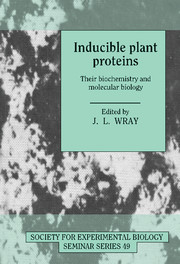Book contents
- Frontmatter
- Contents
- List of Contributors
- Preface
- Metal-binding proteins and metal-regulated gene expression in higher plants
- Phosphate starvation inducible enzymes and proteins in higher plants
- Nitrate reduction in higher plants: molecular approaches to function and regulation
- Inducibility of the glutamine synthetase gene family in Phaseolus vulgaris L.
- Expression and manipulation of genes involved in phenylpropanoid biosynthesis
- Biochemistry and molecular biology of CAM
- ABA- and GA-responsive gene expression
- Regulation of gene expression, ethylene synthesis and ripening in transgenic tomatoes
- Induction of nodulin genes and root nodule symbiosis
- Systemic acquired resistance: an inducible defence mechanism in plants
- Biochemistry and molecular biology of the anaerobic response
- The heat shock response in transgenic plants: the use of chimaeric heat shock genes
- Biochemistry and molecular biology of cold-inducible enzymes and proteins in higher plants
- GBF-1, GBF-2 and GBF-3: three Arabidopsis b-Zip proteins that interact with the light-regulated rbcS-1A promoter
- Index
Preface
Published online by Cambridge University Press: 06 July 2010
- Frontmatter
- Contents
- List of Contributors
- Preface
- Metal-binding proteins and metal-regulated gene expression in higher plants
- Phosphate starvation inducible enzymes and proteins in higher plants
- Nitrate reduction in higher plants: molecular approaches to function and regulation
- Inducibility of the glutamine synthetase gene family in Phaseolus vulgaris L.
- Expression and manipulation of genes involved in phenylpropanoid biosynthesis
- Biochemistry and molecular biology of CAM
- ABA- and GA-responsive gene expression
- Regulation of gene expression, ethylene synthesis and ripening in transgenic tomatoes
- Induction of nodulin genes and root nodule symbiosis
- Systemic acquired resistance: an inducible defence mechanism in plants
- Biochemistry and molecular biology of the anaerobic response
- The heat shock response in transgenic plants: the use of chimaeric heat shock genes
- Biochemistry and molecular biology of cold-inducible enzymes and proteins in higher plants
- GBF-1, GBF-2 and GBF-3: three Arabidopsis b-Zip proteins that interact with the light-regulated rbcS-1A promoter
- Index
Summary
Plants are able to respond and adapt to changing environmental and endogenous signals by the induction of net synthesis of specific proteins which act to modify cellular metabolism. This text, based on papers presented at the Birmingham meeting of the Society for Experimental Biology in April 1991 in a two-day Symposium entitled ‘Biochemistry and Molecular Biology of Inducible Enzymes and Proteins in Higher Plants’, attempts to discuss the role these inducible proteins play in the biochemistry of the cell and the approaches being used to delineate the underlying molecular events which lead to their synthesis.
The topics included in this text do not exhaustively cover all the known responses of plants to environmental and endogenous signals, but a wide range are discussed. Whilst classical approaches, such as protein purification and characterisation, are of great importance in understanding the biochemistry of inducible proteins the molecular cloning of the encoding genes means that transgenic approaches can also be used to unravel the role particular proteins play in metabolism. In particular, the use of antisense RNA to down-regulate the synthesis of specific target enzymes is a particularly powerful technique and its use is discussed here in chapters on nitrate reduction, heat shock, phenylpropanoid biosynthesis and fruit ripening. The way in which transgenic techniques might be used in a broader sense to modify cellular metabolism to man's advantage is also discussed (see for example the chapter on anaerobiosis).
- Type
- Chapter
- Information
- Inducible Plant ProteinsTheir Biochemistry and Molecular Biology, pp. xv - xviPublisher: Cambridge University PressPrint publication year: 1992

